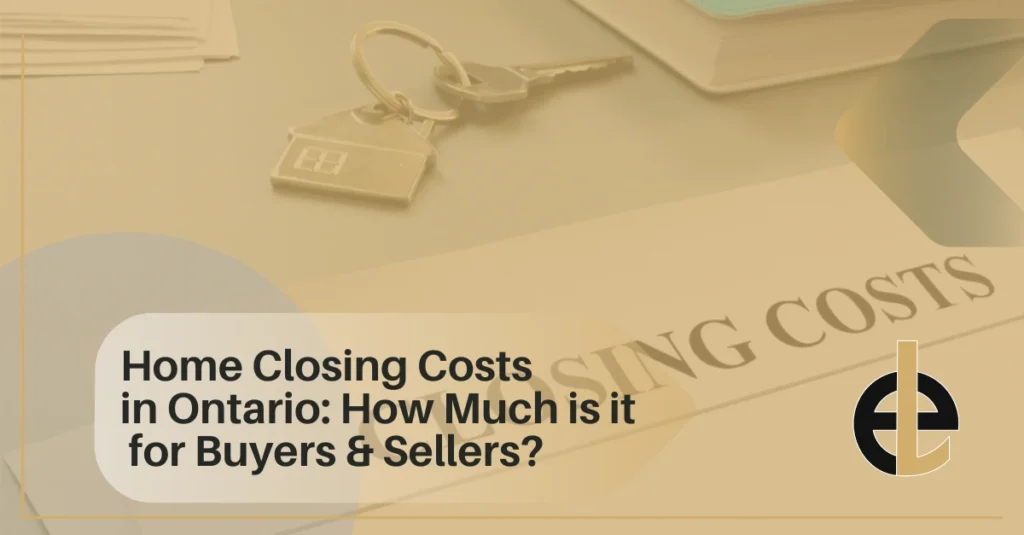Home Closing Costs in Ontario: How Much Is It for Buyers & Sellers?

When buying or selling property in Ontario, people often focus on price and forget about home closing costs. These costs can add up fast and may surprise those new to the process. Working with real estate lawyers helps you avoid mistakes and meet deadlines. The legal experts guide you through everything from fees to title transfer while making sure that things run smoothly. That said, you need to know about closing costs yourself before you sign. This guide will help you plan your property deal better and make sound choices.
Understanding Closing Costs in Ontario as a Buyer or Seller
The closing costs when you secure a real estate deal are all the extra charges and taxes that appear at the end. You will have to fulfill payments for legal services, insurance, and provincial fees.

These costs are crucial because they affect both the buyer’s total payment and the seller’s net gain. In most cases, the buyer must also meet the requirements for filing a land transfer document. This may imply that you pay the transfer tax and check that the title is clear. Know that you cannot register the title if you miss this step.
What Does Legal Help in Closing Costs Matter?
Who pays closing costs in Ontario is a matter involving vital expenses that make a real estate transfer legally sound. Thus, proper support dictates the importance of real estate contracts, as the experts make to record all signatures, titles, and funds. Buyers often forget them and end up short of funds, while sellers must pay certain fees that cut into profits. If missed or unpaid, the deal can be delayed or even cancelled.

How Much Closing Cost for Buyer in Transactions
Buying a home involves more than paying the purchase price. Each buyer must also plan for a list of extra expenses that secure ownership and complete the deal legally.
1. Land Transfer Tax Ontario
This is one of the largest costs for buyers. The province computes it based on the home’s price. The rate rises by bracket: 0.5% on the first $55,000, then up to 2.5% on values above $2,000,000. Toronto adds an extra city tax of the same type. First-time buyers can receive rebates worth thousands, easing the cost a little.
2. Legal and Closing Fees
Legal fees at closing time usually range from $900 to $2,000. Lawyers also charge for disbursements and legal expenses, including courier costs and document searches. You must hire a law firm to manage your forms and payments. Having a seasoned legal expert by your side saves you stress and helps avoid future issues.
3. Title Insurance Costs
This cost protects buyers and lenders from property fraud, unknown liens, or ownership disputes. This is a one-time payment, often between $250 and $500. It depends on the property value and insurer. Lenders normally make this coverage a term of mortgage approval.
4. Home Inspection Costs
Closing costs in Ontariofor buyers include the fees forhome inspection to confirm the property’s condition, which cost around $400 to $700. Banks may also ask for appraisal fees to confirm fair value, which can run $300 to $600. Some buyers also pay survey and inspection costs to check property boundaries.
5. Deed & Mortgage Registration Fees
There are small government charges to record ownership and any new mortgage. The mortgage and deed registration fees are required and normally under $100 each. You may also need to fulfill notary public fees to verify the papers for the registry office. Together, these ensure that your title and loan are legally filed and valid.
6. HST on Legal Services
Knowing what are closing costs when buying a house Ontario and who pays what helps both sides feel secure and prepared. All lawyer fees in Ontario are subject to Harmonized Sales Tax (HST), which becomes a part of your closing balance and must be paid before final registration. It is easy to overlook, but you have to budget for it always.
7. Adjustment Fees for Utilities
If a seller prepaid property taxes, condo dues, or utilities beyond the closing date, the buyer must pay them back. These costs and taxes are listed on the final statement prepared by your lawyer. Even small adjustments can change your total due, so review this section carefully before signing.
How Much Is Closing Cost for Seller
People often ask when selling a house who pays the closing costs. In most cases, both parties have their share, but sellers often pay more due to agent commissions.

Sellers face their own version of closing costs. The main part of closing costs when selling a house is the agent’s commission, legal fees, and mortgage release charges. These costs reduce the total profit from the sale.
The largest item among closing costs for the seller is usually the real estate agent’s commission. This can be around 5% of the sale price, shared between listing and buyer agents. Sellers also pay brokerage commissions and HST on that amount.
The average seller spends around 4% to 8% of the home’s sale price, depending on commission, location, and whether the mortgage is still active.
Although buyers pay the land transfer tax, sellers still face property transfer tax adjustments on some deals, plus legal work to change owners. A lawyer charges for preparing discharge papers and checking that the buyer has met all terms.
Real Estate Transaction Fees & Other Expenses
Small penalties or admin fees may apply if a seller ends a mortgage early. Sellers may also cover minor repairs or cleaning before closing the deal. These steps may be optional, but they can help homes attract buyers faster and sell at better prices. Keep funds ready for closing day and stay alert for errors that could lead to common real estate disputes or delays. Closing costs can be tricky, but a few tips make them easier to manage. Plan early, estimate all costs, and negotiate where possible.
Final Thoughts
Many buyers and sellers wonder who pays closing costs or how much they will owe at the end. These expenses may seem small when you compare them to the price of the home. That said, they have a real impact on your final outcome.
Working with a seasoned real estate lawyer means that you protect your rights and gain much-needed peace of mind. At Estofa Law, our skilled legal team handles paperwork, taxes, and fees according to provincial laws. Whether you are a buyer or a seller, count on us to help you guide you through closing and complete the transaction with certainty. Book a consultation today!

